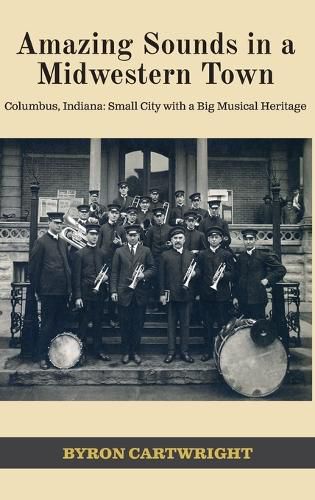Readings Newsletter
Become a Readings Member to make your shopping experience even easier.
Sign in or sign up for free!
You’re not far away from qualifying for FREE standard shipping within Australia
You’ve qualified for FREE standard shipping within Australia
The cart is loading…






This title is printed to order. This book may have been self-published. If so, we cannot guarantee the quality of the content. In the main most books will have gone through the editing process however some may not. We therefore suggest that you be aware of this before ordering this book. If in doubt check either the author or publisher’s details as we are unable to accept any returns unless they are faulty. Please contact us if you have any questions.
Between 1846 and 1966, in the unlikely creative world of Bartholomew County, Indiana, innovation prevailed and quality of life was pursued. We can't divorce innovation then from what is available now; . The past led to the present, and the present shapes the future. Performers, educators, and philanthropists of a bygone era actively brought forth new ideas. Worlds of church, school, and community overlapped and interacted almost seamlessly for decades as a backdrop for musical creativity.
There were no "stodgy" old-timers as a cursory view of music history might falsely suggest. Joseph I. Irwin, A. D. Fillmore, Francis J. Crump, John Smith Crump, J. G. Schwartzkopf, Benjamin Hutchins, William and Jennie Bates, Arthur Mason, Will Harding, Jessie Kitchen, Ida Edinburn, G. Chester and Elise Kitzinger, Gary F. Davis Sr., Elsie Sweeney, Nettie Sweeney Miller, J. Irwin Miller, the Barbour brothers, and E. Wayne Berry, and many more, were innovators (often in their twenties and thirties!), not maintainers of a sacred status-quo.
So is our world of instant musical gratification better, richer, and more diverse? The final answer is ours to decide. Putting our minds and imaginations in the world of some outstanding people during the 120-year scope of this book can enrich our viewpoint and help us assess our self-indulgent musical souls. As you read this book, escape your present by turning to the past, then return to your present with a fresh perspective on what to do with it.
$9.00 standard shipping within Australia
FREE standard shipping within Australia for orders over $100.00
Express & International shipping calculated at checkout
This title is printed to order. This book may have been self-published. If so, we cannot guarantee the quality of the content. In the main most books will have gone through the editing process however some may not. We therefore suggest that you be aware of this before ordering this book. If in doubt check either the author or publisher’s details as we are unable to accept any returns unless they are faulty. Please contact us if you have any questions.
Between 1846 and 1966, in the unlikely creative world of Bartholomew County, Indiana, innovation prevailed and quality of life was pursued. We can't divorce innovation then from what is available now; . The past led to the present, and the present shapes the future. Performers, educators, and philanthropists of a bygone era actively brought forth new ideas. Worlds of church, school, and community overlapped and interacted almost seamlessly for decades as a backdrop for musical creativity.
There were no "stodgy" old-timers as a cursory view of music history might falsely suggest. Joseph I. Irwin, A. D. Fillmore, Francis J. Crump, John Smith Crump, J. G. Schwartzkopf, Benjamin Hutchins, William and Jennie Bates, Arthur Mason, Will Harding, Jessie Kitchen, Ida Edinburn, G. Chester and Elise Kitzinger, Gary F. Davis Sr., Elsie Sweeney, Nettie Sweeney Miller, J. Irwin Miller, the Barbour brothers, and E. Wayne Berry, and many more, were innovators (often in their twenties and thirties!), not maintainers of a sacred status-quo.
So is our world of instant musical gratification better, richer, and more diverse? The final answer is ours to decide. Putting our minds and imaginations in the world of some outstanding people during the 120-year scope of this book can enrich our viewpoint and help us assess our self-indulgent musical souls. As you read this book, escape your present by turning to the past, then return to your present with a fresh perspective on what to do with it.